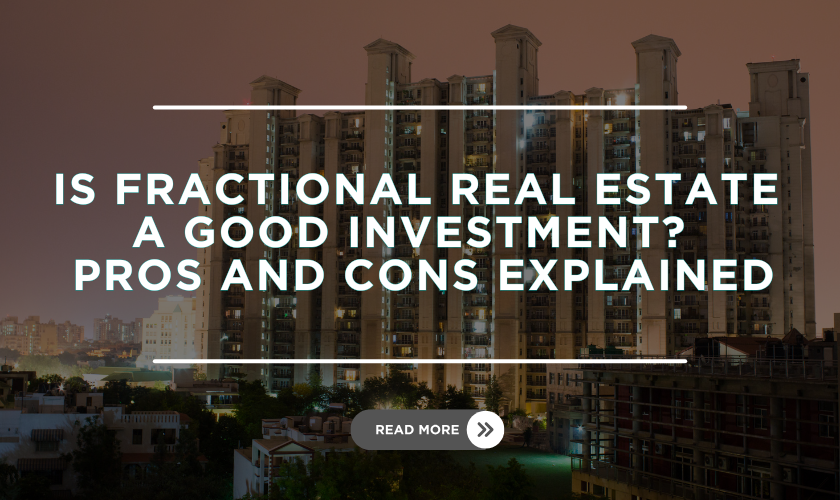
29
JanIs Fractional Real Estate a Good Investment? Pros and Cons Explained
Introduction
Real estate has always been the first choice of investors looking for long-term growth and stable returns. However, it requires large upfront capital. The solution comes in the form of fractional real estate investment, which allows several investors to co-own a property. But is fractional real estate a good investment? Let's talk about the pros and cons that will help you make a decision.
Understanding Fractional Real Estate Investment
It is a fractional real estate investment wherein an investor can buy a fraction of a property and not the entire asset. This is a new way through which the portfolios of investors can be diversified with reduced financial risks. For instance, the properties showcased on certain professional platforms provide the possibility of co-ownership of premium residential plots and developing the same, thus enjoying the benefits of both market appreciation and development returns, a model that marries traditional real estate returns with developer-like profit.
Titles and fund management on the escrow account ensure investor participation in the management of asset-owning companies with clear protection and transparency.
The Pros of Fractional Real Estate Investment
1. Reduced Barrier to Entry
The specialty of such a platform is that, e.g., the Gurgaon luxury properties, which previously required 2-digit crores of capital for a single unit investment, now come within reach for mid-range investors in lakhs.
2. Diversification
Diversification of capital among different properties located at various places would reduce risks and make the portfolios more robust.
3. Professional Management
End-to-end property management, including acquisition, development, and sales shall be handled by professionals. This way, the investors are relieved from the burden of complexity in handling real estate.
4. Dual Returns
Certain specialized platforms will make the investors capable of earning profits at the same time on account of appreciation in the property and development profits, thereby giving an edge over the conventional models of real estate like REITs.
5. Liquidity and Flexibility
Fractional models generally have a structured exit. Investors can liquidate their share or debenture after a given time the option made available by such specialized platforms .
The Cons of Fractional Real Estate Investment
1. Group Decision-Making
Co-ownership of a property demands that decisions regarding its management and sale be taken collectively, which leads to delay and disputes.
2. Lack of Control
Most major decisions are kept at the board and management level of the asset-owning company by the investors. Certain specialized platforms have minimized this aspect by providing access to periodic reporting and dashboards to the investors, which will be provided by asset-owning companies, but most platforms face a problem in having direct control.
3. Illiquidity Risks
Although fractional investments are more liquid than traditional real estate, they are not very easily tradable like stocks.
4. Market Risks
Like all real estate investments, market fluctuations are part of fractional ownership. However, the risk is minimized by certain specialized platforms by focusing on high-demand micro-markets with high appreciation potential.
How certain specialized platforms redefine Fractional Real Estate
Certain specialized platforms make this otherwise very complicated real estate development very much simplified. Co-ownership by investors of the prime residential plots and sharing the market appreciation as well as the returns generated from the actual development, for the first time in India. Separate asset-owning company structure ensures the following:
Transparency: Funds would be managed in escrow accounts monitored by corporate trustees.
Risk Mitigation: Each asset-owning company runs independently, where assets are segregated from cross-liability.
Professional Oversight: All activities from buying to selling are taken care of by professionals.
As explained earlier, the model has performed well and generated higher returns and a quicker exit than the classical investment.
FAQs
1. What is Fractional Real Estate Investment?
The ownership of any property can be divided into portions among various investors, hence, participation in prime markets now can be made even with a small amount of investment.
2. Is fractional real estate good to invest in?
Yes, especially for investors who wish for diversification, and with low entry barriers and professional management, though one must weigh the risks involved with limited control and market fluctuations.
3. How do certain specialized platforms ensure transparency and security?
There is a separate asset-owning company for every project which holds the funds in escrow accounts and provides investors with frequent updates on SQRE’s dashboards so that everything remains transparent.
4. Can I exit a fractional real estate investment?
Many platforms provide a systemic exit where the investor can sell shares or debentures after holding an initial period.
5. What are the returns?
Returns are project-specific and market situations. By investing in such opportunities, investors enjoy double returns: appreciation in the market and development profits, which is higher than in the traditional models of real estate.
Table: Pros and Cons of Fractional Real Estate Investment
Aspect | Pros | Cons |
Cost | Low barrier to easy | Shared decision-making |
Diversification | Exposure to multiple properties | Limited control |
Management | Professional oversight | Reliance on third parties |
Returns | Dual returns from appreciation & development | Subject to market risks |
Liquidity | Structured exit options | Liquidity risks |
Conclusion
Fractional property investment is considered promising for diversified investment portfolios and for high-market-value investment. Such specialized platforms transform the traditional real estate model when it creates dual returns by market appreciation and development returns while incorporating transparency and professional management.
It is through high-growth micro-markets in Gurgaon that such specialized platforms bring the investor access to a secure, profitable, and transparent entry into the real estate market.